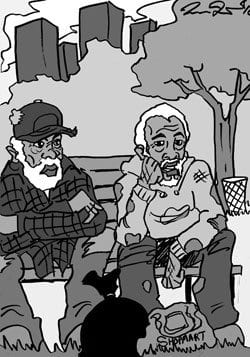
Professor Gates skips over relevance
The issue of reparations gained prominence in January 1989 when Rep. John Conyers of Detroit introduced a bill entitled a “Commission to Study Reparation Proposals for African Americans Act.” In every Congress since then he has refiled H.R. 40. Despite Conyers’ long tenure in Congress and his elevation in January 2007 to chairman of the House Judiciary Committee, there has never been sufficient political muscle to enact his proposal.
Nonetheless, H.R. 40 has stood as a constant reminder to the nation’s lawmakers of the evils of slavery and the reluctance of Congress to enact laws, in a timely way, to assure freedom, justice and equality for all U.S. citizens. It was not until the Civil Rights Act of 1964 and the Voting Rights Act of 1965 that the legislation needed to assure these rights was established.
Conyers’ proposal was modest. It would establish a commission to study slavery, the subsequent racial and economic discrimination against former slaves, and the impact of those practices on African Americans today. It would also recommend remedies to redress the harm inflicted. Other more radical reparations proposals were also presented by black activists, but none generated much public enthusiasm.
Despite the fact that campaigns for reparations have become more symbolic than substantive, Henry Louis Gates Jr., a Harvard professor and director of the W.E.B. DuBois Institute, has decided to impugn the validity of such efforts in an article entitled “Ending the slavery blame-game,” published in The New York Times of April 23, 2010.
The gravamen of his thesis seems to be that since Africans were sold into slavery by other Africans, then the descendants of slaves have thereby forfeited the right to bring a claim against white slaveholders or their descendants. Professor Gates fails to understand that the complaint would be against the U.S. government for the immoral and unlawful conduct of those in power. If damages in the nature of reparations were established, then all U.S. taxpayers would be liable, regardless of race.
As Professor Gates points out, slavery was a common practice in Africa. He could very well extend information on that practice to include Europe, Asia and the Middle East. However, the universality of slavery does not minimize its repugnance under American jurisprudence. Slavery which began in Africa was brought to full flower in America, where it surreptitiously continued under other names, even after the enactment of the 13th Amendment in 1865.
The fundamental issue is not about reparations. With or without a reparations act, Americans have the solemn responsibility to make whole those who have been damaged by the humanly destructive practice of slavery and its progeny.
What does it take?
How would 27 years of prison confinement affect your temperament? Would it be worse if you were imprisoned for a crime you did not commit?
The Boston Globe account of the parole board hearing for Benjamin LaGuer was heart- wrenching. This was his fourth chance to be freed, but according to the Globe report, he seemed to know it would not happen.
In this go-along-to-get-along society, LaGuer has a resolute attitude that tends to offend others. They have to respect someone who is willing to spend the rest of his life in prison rather than dissemble for a get-out-of-jail card. His hearing inquisitors undoubtedly suspect that they themselves could not endure 27 years behind bars without breaking.
It appears that LaGuer’s jailers are willing to resolve their doubt by concluding that strong character is an indication of a potential risk to the public. They are, therefore, willing to run the risk to their moral character by depriving a man of his freedom, even with no credible evidence that he poses a danger to the public.
LaGuer will survive; but members of the parole board will have to live with the burden that they are willing to deny an innocent man the freedom due all Americans.






